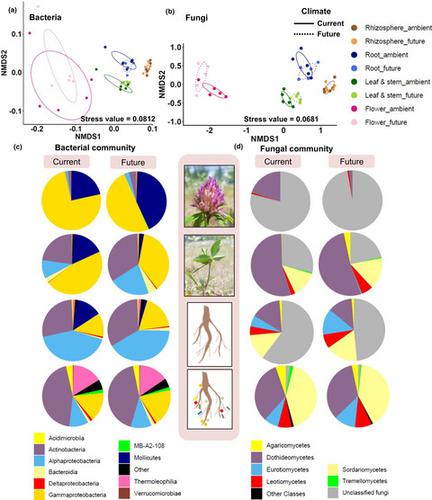当前位置:
X-MOL 学术
›
Microbiologyopen
›
论文详情
Our official English website, www.x-mol.net, welcomes your feedback! (Note: you will need to create a separate account there.)
Deciphering Trifolium pratense L. holobiont reveals a microbiome resilient to future climate changes
MicrobiologyOpen ( IF 3.4 ) Pub Date : 2021-07-23 , DOI: 10.1002/mbo3.1217 Sara Fareed Mohamed Wahdan, Benjawan Tanunchai, Yu-Ting Wu, Chakriya Sansupa, Martin Schädler, Turki M. Dawoud, François Buscot, Witoon Purahong
MicrobiologyOpen ( IF 3.4 ) Pub Date : 2021-07-23 , DOI: 10.1002/mbo3.1217 Sara Fareed Mohamed Wahdan, Benjawan Tanunchai, Yu-Ting Wu, Chakriya Sansupa, Martin Schädler, Turki M. Dawoud, François Buscot, Witoon Purahong

|
The plant microbiome supports plant growth, fitness, and resistance against climate change. Trifolium pratense (red clover), an important forage legume crop, positively contributes to ecosystem sustainability. However, T. pratense is known to have limited adaptive ability toward climate change. Here, the T. pratense microbiomes (including both bacteria and fungi) of the rhizosphere and the root, shoot, and flower endospheres were comparatively examined using metabarcoding in a field located in Central Germany that mimics the climate conditions projected for the next 50–70 years in comparison with the current climate conditions. Additionally, the ecological functions and metabolic genes of the microbial communities colonizing each plant compartment were predicted using FUNGuild, FAPROTAX, and Tax4Fun annotation tools. Our results showed that the individual plant compartments were colonized by specific microbes. The bacterial and fungal community compositions of the belowground plant compartments did not vary under future climate conditions. However, future climate conditions slightly altered the relative abundances of specific fungal classes of the aboveground compartments. We predicted several microbial functional genes of the T. pratense microbiome involved in plant growth processes, such as biofertilization (nitrogen fixation, phosphorus solubilization, and siderophore biosynthesis) and biostimulation (phytohormone and auxin production). Our findings indicated that T. pratense microbiomes show a degree of resilience to future climate changes. Additionally, microbes inhabiting T. pratense may not only contribute to plant growth promotion but also to ecosystem sustainability.
中文翻译:

破译 Trifolium pratense L. holobiont 揭示了对未来气候变化具有弹性的微生物组
植物微生物组支持植物生长、健康和对气候变化的抵抗力。三叶草(红三叶草)是一种重要的豆科牧草作物,对生态系统的可持续性做出了积极贡献。然而,T。 众所周知,pratense对气候变化的适应能力有限。在这里,T。 口头禅在位于德国中部的一个田地中使用元条形码对根际和根、芽和花内圈的微生物组(包括细菌和真菌)进行了比较检查,该田地模拟了未来 50-70 年的气候条件,与当前的气候条件相比气候条件。此外,使用 FUNGuild、FAPROTAX 和 Tax4Fun 注释工具预测了定植每个植物区室的微生物群落的生态功能和代谢基因。我们的结果表明,单个植物区室被特定微生物定殖。地下植物区室的细菌和真菌群落组成在未来的气候条件下没有变化。然而,未来的气候条件略微改变了地上部分特定真菌类别的相对丰度。我们预测了几种微生物功能基因Ť。 参与植物生长过程的pratense微生物组,例如生物施肥(固氮、磷溶解和铁载体生物合成)和生物刺激(植物激素和生长素生产)。我们的研究结果表明,T . pratense微生物组显示出对未来气候变化的一定程度的适应能力。此外,居住在T 中的微生物。 pratense不仅可以促进植物生长,还可以促进生态系统的可持续性。
更新日期:2021-07-24
中文翻译:

破译 Trifolium pratense L. holobiont 揭示了对未来气候变化具有弹性的微生物组
植物微生物组支持植物生长、健康和对气候变化的抵抗力。三叶草(红三叶草)是一种重要的豆科牧草作物,对生态系统的可持续性做出了积极贡献。然而,T。 众所周知,pratense对气候变化的适应能力有限。在这里,T。 口头禅在位于德国中部的一个田地中使用元条形码对根际和根、芽和花内圈的微生物组(包括细菌和真菌)进行了比较检查,该田地模拟了未来 50-70 年的气候条件,与当前的气候条件相比气候条件。此外,使用 FUNGuild、FAPROTAX 和 Tax4Fun 注释工具预测了定植每个植物区室的微生物群落的生态功能和代谢基因。我们的结果表明,单个植物区室被特定微生物定殖。地下植物区室的细菌和真菌群落组成在未来的气候条件下没有变化。然而,未来的气候条件略微改变了地上部分特定真菌类别的相对丰度。我们预测了几种微生物功能基因Ť。 参与植物生长过程的pratense微生物组,例如生物施肥(固氮、磷溶解和铁载体生物合成)和生物刺激(植物激素和生长素生产)。我们的研究结果表明,T . pratense微生物组显示出对未来气候变化的一定程度的适应能力。此外,居住在T 中的微生物。 pratense不仅可以促进植物生长,还可以促进生态系统的可持续性。

























 京公网安备 11010802027423号
京公网安备 11010802027423号